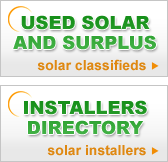
|
Florida residential solar energy incentivesRenewable energy property tax exemption 100% of the total cost of the renewable energy system or device including installation is entitled to an exemption. Qualifying systems must be installed on or after January 1, 2009. Eligible technologies include solar water heat, photovoltaics, wind and geothermal heat pumps. Solar energy systems equipment sales tax exemption All solar energy systems are exempt from Florida’s sales and use tax. Solar energy systems include; solar water heat, photovoltaics, solar space heat and solar pool heating. Solar energy system incentives program This program provides financial incentives for purchasing and installing solar energy systems Incentive amounts for Florida residents are as follows; Residential solar PV systems = $4 per kilowatt DC up to $20,000 Residential solar water heaters = $500 per installation Solar thermal pool heaters = $100 per installation Lakeland Electric – Solar water heating program This program from Lakeland Electric offers its residential customers solar-heated hot water on a “pay for energy” basis. Lakeland owns and installs all solar water heaters in participating customer’s home. This eliminates the equipment and maintenance cost for the customer Customers are only billed for hot water delivered to the faucet. The solar energy cost on this program is $0.08 per kilowatt as opposed to the electric rate of $0.13 per kilowatt. Gainesville Regional Utilities – Solar Feed-In-Tariff Residential customers who own PV systems that are no greater than 10 kilowatts are eligible to enter a feed-in-tariff (FIT) agreement to sell 100% of their electricity to Gainesville Regional Utilities. Agreements have a set rate for a 20 year period. Fixed rates start at $0.32 for mounted systems or $0.26 for free standing systems. Orlando Utilities Commission – pilot solar program This program allows Orlando Utilities Commission to purchase renewable energy credits from its customers who purchased and installed photovoltaic and/or solar thermal energy systems. Incentive payments are $0.05 per kilowatt (for the first 600 kilowatts) for PV systems and $0.03 per kilowatt (for the first 1,200 kilowatts generated) for solar water heating systems. Payments are received as a form of credit on the customer’s monthly utility bill. Miami-Dade County – Green buildings expedite process Residential projects located in Miami-Dade County are eligible for an expedited permitting process for green buildings. Green buildings are designed to be environmentally sensitive and must be certified by an environment rating agency to qualify for this incentive. Orange County – Solar hot water rebate program This is a local rebate program for residents in Orange County. Residents who install solar hot water systems in the county are eligible for a $200 rebate. To qualify, the system owner must complete an application and include an invoice showing the installation date and a receipt of a solar hot water rebate from the utility as well as proof of an energy audit. The system must be installed on or after April 22, 2008. Utility-sponsored loan and solar rebate programs Many utility loan and rebate programs are available throughout the state of Florida, provided by municipal cities and utility companies. Information and details on all the different programs are available on the internet. Details and requirements for each program will vary. Loan and rebate programs are generally available for customers who install solar photovoltaic and solar water heat systems. Loans are usually have a low interest rate to help with the purchase and installation of solar and other energy efficiency technologies. Rebate amounts are typically determined by a per-watt AC basis and depending on the system’s size and applicable sector. Residential Renewable Energy Tax Credit This personal tax credit allows the taxpayer to claim a credit of 30% of expenditures including labor costs and installation of qualified residential solar-electric systems, solar water heating systems or fuel cells. Small wind-energy systems and geothermal heat pumps can also be accredited for. Solar-electric systems and solar water heaters have a maximum incentive of $2,000 if placed in service before 2009. There is no maximum incentive for systems placed after 2008. The excess amount of the federal tax credit may be carried forward to the next taxable year if it exceeds tax liability. This can be carried forward until 2016, but after that, it is unknown if the unused credit will be able to be forwarded. Residential Energy Conservation Subsidy Exclusion This is a personal exemption of 100% of energy conservation subsidies provided by public utilities. The value of a purchase or installation of any energy conservation measure by a customer such as solar water heat, solar space heat or photovoltaics will not be included in the customer’s gross income. Customers of an electric utility company, who participate in the utility’s energy conservation program, may receive a rate reduction of electricity furnished or a nonrefundable credit against the purchase price of the electricity on each monthly electric bill. Energy-Efficient Mortgages
 |






